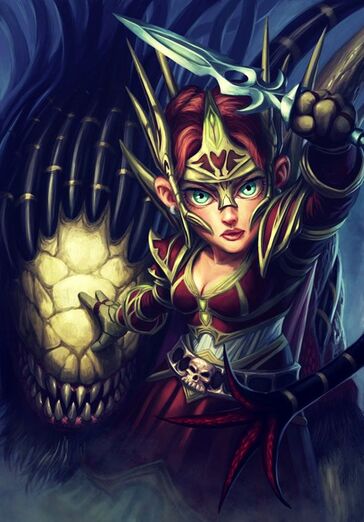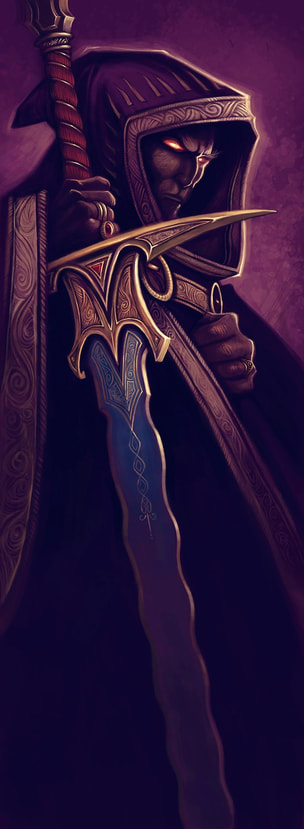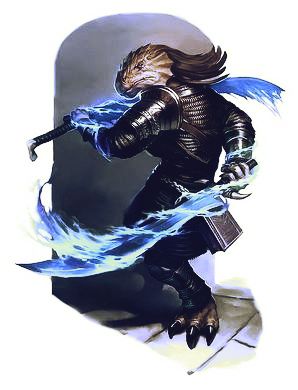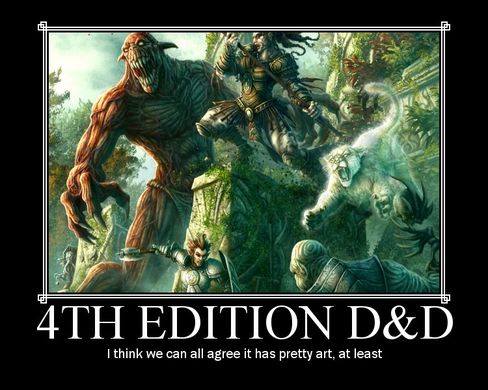4) Class Traits and Abilities
Warlocks act as Strikers - bringing divine punishment upon their enemies, but they're not tank-y in any way. My key abilities are Charisma, Constitution, and Intelligence, in that order, so my Gnome racial bonuses are BOSS. Let's stat it out:
STR 11 (+0) DEX 12 (+1) CON 16 (+3) = 15 + 1 at Level 4. INT 16 (+3) = 14 + 2 WIS 10 CHA 20 (+5) = 17 + 2 + 1 at Level 4. Being Small, my speed is only 5 squares, but it helps to have some Low-Light Vision too. Armor is Cloth and Leather only, but my Defense Bonuses are +1 to Reflex and +1 Will. Weapon Proficiencies: Simple Melee, Simple Ranged 1) ELDRITCH BLAST - Your At-Will powers are intrinsically tied to your class choice by theme and pact, so Eldritch Blast is an automatic At-Will power. Your Eldritch Pact decides your other At-Will power... 2) ELDRITCH PACT - You get three choices: Fey, Infernal, Star. This selection decides your second At-Will power, as it is mechanically tied to the flavor of the pact. Star punishes movement toward you with Dire Radiance (Movement), Fey makes you Invisible with Eyebite (Buff), Infernal channels additional damage to a target when I take damage with Hellish Rebuke (Offense). Each one is still an initial attack roll, with the appropriate follow-up bonus. I'm going with Hellish Rebuke, because the language specifies that the target doesn't have to be the one that damages me; I could take damage from something else entirely, and still automatically deal 1d6+3 fire damage to my chosen target. That's nice. Also, I get Dark One's Blessing, which grants me temporary HP when a creature under my Warlock's Curse (see below), dies. 3) PRIME SHOT - As long as I'm the closest to my target (so no ally is closer than I), I get a +1 to all ranged attack rolls against that target. Nifty. 4) SHADOW WALK - As long as I travel at least 3 squares on my turn, I gain Concealment until the end of my next turn. Which is great, because I plan to keep my distance whenever possible. 5) WARLOCK'S CURSE - once per turn, as a Minor Action, I curse a dude. That dude is more vulnerable to my nasty attacks and takes extra damage (+1d6 for now). So there. 6) IMPLEMENTS - Warlocks make use of specific powerful wands or rods or pact daggers that add extra powers or bonuses to their spells. Cool beans. 5) Powers (Spells)
A Level 4 dude has 2 At-Will Powers, 2 Encounter Powers (not including other class features, or racial abilities), 1 Utility Power, and 1 Daily Power. Many of my powers are already pre-determined by my Infernal Pact choice, so let's just lay them out.
At-Wills 1) Eldritch Blast - you can choose your Charisma or Constitution to help out with this spell, but you can't change later. Charisma is my OBVIOUS CHOICE with a +5 modifier. With the added benefit of this spell counting as a basic ranged attack, allies that grant such opportunities open up a world of hurt against our enemies. 2) Hellish Rebuke - Constitution-based ranged attack vs. Reflex, so 1d6+3 fire damage if I hit. The added bonus is they take an extra 1d6+3 fire damage if I take ANY damage before the end of my next turn. Encounters Racial) Fade Away - We've talked about this. Take damage, go invisible! 1st Level) Diabolic Grasp - Another Constitution-based power that hits nice for 2d8+3, and will move the target 4 freaking squares! 3rd Level) Fiery Bolt - 3d6+3 fire damage, and burst 1 with 1d6+3 fire damage, with another +3 for my Intelligence. Ouch. Daily 1) Armor of Agathys - Gain some 13 Temporary Hit points and any enemy that starts its turn adjacent to me takes 1d6+3 Cold damage until the END OF THE ENCOUNTER. Utility - Daily 2nd Level) Fiendish Resilience - Minor Action to give myself 8 temporary hit points. Meh. No choice in the matter. FEAT SELECTION 1) Improved Initiative - the earlier I go, the better. +4. 2) Improved Dark One's Blessing - when a Cursed enemy drops to 0, I'll gain 7 temp HP instead of 4. 4) Magic Of The Mists - retain Fade Away when I attack. Booyah. 6) Gear and Overview
Basic Melee = Sickle; +4 to hit, 1d6 damage --- Sickles have +2 Proficiency, + Strength (0) + 1/2 Level (2)
Basic Ranged = Hand Crossbow; +5 to hit, 1d6+1 damage --- Hand Crossbows have +2 Proficiency + Dex (1) + 1/2 Level (2)* **I don't plan on using this, as my Eldritch Blast counts as a Basic Ranged Attack. 1d10+5, with a +9 to hit is way better.** Implement: Magic Tome = +1 Attack and Damage rolls, but on a Critical add 1d6 damage. At-Will Powers: ELDRITCH BLAST, Hellish Rebuke Encounter Powers: Fade Away [R], Diabolic Grasp, Fiery Bolt Daily Powers: Armor of Agathys HP: 30 (15 at level 1, +5 per level [15]) Healing Surges: 9 (6+3) Surge Value: 7 AC: 15 --- (10+1/2 level [12]+Dexterity Mod [1]+Leather Armor [2] Fortitude: 15 --- (10+1/2 Level [12]+Con Mod [3]) Reflex: 16 --- (Int +3 + 12 + 1) Will: 18 --- (Cha +5 + 12 + 1) Trained Skills: Arcana, Bluff, Intimidate, Streetwise Gnome made. Let's blow some stuff up. See you at the table. -Adamus
0 Comments
4) Class Traits + Ability Distribution
Avengers act as Strikers - bringing divine punishment upon their enemies, but they're not tank-y in any way. My key abilities are Wisdom, Dexterity, and Intelligence, in that order, so my Deva racial bonuses are right ON POINT. Let's stat it out:
STR 11 (+0) DEX 18 (+4) = 17 + 1 at Level 4. CON 12 (+1) INT 16 (+3) = 14 + 2 WIS 18 (+4) = 15 + 2 + 1 at Level 4. CHA 10 (+0) Armor is Cloth only, so I'm pleased that my Defense Bonuses are +1 to Fortitude, Reflex, and Will. Weapon Proficiencies: Simple and Martial Melee, and just Simple Ranged (so I guess I'm going up close and personal) Now, that Armor proficiency feels a bit disappointing, but the Avenger gets a few little features to help out their "battle cleric" status: 1) ARMOR OF FAITH - as long as I'm not in heavy armor or using a shield, my deity rewards my courage in the face of certain doom with a +3 bonus to my AC. 2) AVENGER'S CENSURE - I choose one of two bonuses that tie directly to a creature that is the target of my Oath Of Enmity (what up, 5E Vengeance Paladin?), Pursuit or Retribution. I like the damage bump (3 from my Int) of Retribution, as well as the synergy in Power selection later (you'll see), so I'll go with that. 3) OATH OF ENMITY - select a chosen prey, and take the best of two attacks on them until the end of the Encounter as a Minor Action. Woof. Probability is now on my side. 4) CHANNEL DIVINITY - you start with two Channel Divinity powers (more if you take certain Feats): Abjure Undead (deal sick damage to one undead target and immobilize them) and Divine Guidance (let an ally roll twice for an attack). Both Encounter powers, so I've got 'em each fight. 5) Powers
A Level 4 dude has 2 At-Will Powers, 2 Encounter Powers (not including other class features, or racial abilities), 1 Utility Power, and 1 Daily Power. Let's get to it.
At-Wills - my focus is on dealing decent damage and chasing down opponents so I can smite the crud out of them: 1) Bond of Pursuit - Weapon attack plus Wisdom Modifier damage, but the kicker is that I can chase down the target if he ends his turn away from me. 2) Bond of Retribution - decent damage and radiant damage tied to my Intelligence if an enemy other than my target smacks me. That'll learn 'em good. :) Encounters Racial) Memory of a Thousand Lifetimes - didn't like that roll? Let's add 1d6 to it! Class Feature [CF]) Oath of Enmity - roll two attacks and take the better result for the whole fight or when the thing dies. All that for a Minor Action. CF) Channel Divinity: Abjure Undead - immobilize and wreck one undead creature. CF) Channel Divinity: Divine Guidance - when an ally attacks your Enmity target, have them roll twice and take the better result. Yes please hit my quarry! 1st Level) Avenging Echo - Don't stand so close to me! Until the end of my next turn, enemies near me take 8 radiant damage (5 + 3 from my Int because of Censure of Retribution). 3rd Level) Halo Of Fire - same deal as Echo, but better weapon damage, and this time it's 8 fire damage. Daily 1) Temple Of Light - Double weapon damage + Wisdom radiance AND it creates a zone of extra damage that follows the target. Creatures struck by me in such a zone take extra damage. I see this limiting a target's movement, as the spillover damage to their own allies is less than helpful. Utility - Encounter 2nd Level) Resonant Escape - triggered by being hit, or missed, I get to teleport a few squares away. Cool. FEAT SELECTION 1) Improved Armor Of Faith - an additional bonus to AC that increases at later levels (+1 for now) 2) Melee Training - effectively (if I pick Dexterity) turns my basic melee attacks into 5E finesse weapons, so I can use my Dexterity modifier to slice the junk out of enemies instead of Strength. 4) Melora's Tide - another Channel Divinity option that grants some regeneration to me or an ally until we're not half dead. 6) Gear and Overview
Basic Melee = Longsword; +9 to hit, 1d8+4 damage --- Longswords have +3 Proficiency, + Dexterity (4) + 1/2 Level (2)
Basic Ranged = Crossbow; +8 to hit, 1d8+4 damage --- Crossbows have +2 Proficiency + Dex (4) + 1/2 Level (2) At-Will Powers: Bond Of Pursuit, Bond Of Retribution Encounter Powers: Memory of a Thousand Lifetimes (Racial), Oath Of Enmity (CF), CD Abjure Undead (CF), CD Divine Guidance (CF), Avenging Echo, Halo Of Fire, Resonant Escape (Utility) Daily Powers: Temple Of Light HP: 33 (15 at level 1, +6 per level [18]) Healing Surges: 8 Surge Value: 8 AC: 20 --- (10+1/2 level [12]+Dexterity Mod [4]+Armor Of Faith [4] Fortitude: 14 --- (Con Mod [1] + 12 + 1) Reflex: 17 --- (Dex +4 + 12 + 1) Will: 17 --- (Wis +4 + 12 + 1) Trained Skills: Religion + Acrobatics, Heal, Perception Time to kick some butt, Vered Felstaff. Let's rock.
See you at the table.
- Adamus Why This One?
The first creature I played in 4th Edition was a Dragonborn Ranger. I loved the idea of dual-wielding swords and breathing lightning. It was dream come true.
I was mobile, strong, and very dangerous up close. I didn't have a bunch of Hit Points, but my enemies were often dead before they could deal much damage. I was beautiful. And with many fond memories flooding back, I figured I could ride this momentum into our first main build in this system. 1) Ability Scores, Racial Improvements, and Distribution
Though I'm usually in favor of rolling for my ability scores, luck tends to kick me in the face for this edition. It is strangely much better to go with the standardized heroic array found in the Player's Handbook. So, for each of these builds going forward, our choices are: 16, 14, 13, 12, 11, and 10.
RANGER Key Ability Scores: Strength, Dexterity, Wisdom Dragonborn Ability Score Improvements: +2 Strength, +2 Charisma So, the race bonus didn't entirely line up with my needs, but I didn't really care. Plus, since we're building each of these to LEVEL 4, so I've got an ability score increase to think about too. Let's flesh out my scores. STR = 14+2 = 16 +1 at Level 4 = 17 (+3) DEX = 16 (+3) CON = 12 (+1) INT = 11 (+0) WIS = 13 +1 at Level 4 = 14 (+2) CHA = 10+2 = 12 (+1) 2) Race Features
DRAGONBORN
Pretty run of the mill here. Medium creature, moves 6 squares each round, no darkvision (bummer). Draconborn Fury - when I'm Bloodied (down to half or below half my Hit Points), I get a +1 bonus to all my attacks. Draconic Heritage - makes my Healing Surge value bigger (1/4 my total HP + my Constitution modifier). DRAGON BREATH Power - the reason I took the race in the first place... An excellent Encounter Power. 3) Style, Powers, and Feats
Rangers operate from two main battle paradigms: Ranged and Dual-Wielding. I'm going with the latter, and fulfilling my original idea of an up-close Striker. This choice also grants Toughness as a Bonus Feat.
On top of this, a Ranger gains the Hunter's Quarry feature: as a Minor Action, you can designate the nearest enemy to you that you can see as your Quarry. Once per round, you can deal extra damage to that quarry when you hit them, and that damage increases every 10 levels or so (ours will be at +1d6 for now). At level 1, I need to select 2 At-Will Powers, 1 Encounter Power (useable once per fight), and 1 Daily Power, plus my Racial Power. Level 2 I get a Utility Power, Level 3 another Encounter Power, and Level 4...an ability score increase. Also, at Levels 1, 2, and 4, I select a Feat. At-Wills are pretty obvious here: 1) Twin Strike - effective double attack. 2) Hit and Run - run past, slice through, keep running and no Attack of Opportunity. Encounters Racial) Dragon's Breath - we'll go with lightning, I think. :) 1st Level) Evasive Strike - I can shift around the board 2 squares before or after the attack, and I deal double weapon damage + my Strength modifier. 3rd Level) Thundertusk Boar Strike - another double attack with a push; if both attacks hit, I push 'em a number of squares equal to my Wisdom Modifier (which I want to increase!). Daily 1) Hunter's Bear Trap - Double weapon damage + Strength + slowed target + 5 ongoing damage if they can't save to stop it. Ha. Utility - Encounter 2nd Level) Yield Ground - triggered by being hit, I can move away and gain a +2 bonus to all of my defenses. Gotta watch myself! FEAT SELECTION 1) Dragonborn Senses - gain Low-Light Vision, and +1 to Perception 2) Enlarged Dragon Breath - increases the size of my Dragon Breath. Booyah. 4) Dragonborn Frenzy - +2 damage when I'm bloodied. Because often the best protection is to eliminate threats faster, and that's damage. 4) Gear, Skills, and Proficiency
+ For Armor, I'm proficient in Cloth, Leather, and Hide only, so I'll pick standard Hide for a +3 to my AC.
+ Weapons are a little more vast, with Simple and Military grade melee and ranged. Let's snag two Longswords to lay down the law with a little higher accuracy, and a Longbow for good measure. + Defense Bonuses: +1 Fortitude, +1 Reflex + Hit Points at first level end up being only 13 (12+Con modifier), with increases of 5 per level, so add another 15 on for only 28 HP at level 4. Even with Toughness, that only raises it to 33 HP. Argh. We'll see if we can do something about that. + Healing Surges = 7 per day, at 8 HP per surge (thanks Dragonborn). + Trained Skills (+5 training bonus): Dungeoneering or Nature (I pick NATURE), plus four others from a decent list - let's go with Acrobatics, Athletics, Perception, and Stealth. 5) Overview and Future Choices
Basic Melee = Longsword; +8 to hit, 1d8+3 damage
Basic Ranged = Longbow; +7 to hit, 1d10+3 damage At-Will Powers: Twin Strike, Hit and Run Encounter Powers: Dragon's Breath, Evasive Strike, Thundertusk Boar Strike, Yield Ground (Utility) Daily Powers: Hunter's Bear Trap HP: 33 AC: 18 --- (10+1/2 level [2]+Dexterity Mod [3]+Armor Bonus [3] Fortitude: 16 Reflex: 16 Will: 13 Yeah. That's about right. Welcome back, Helaku Stormwind. Let's play. See you at the table. - Adamus What The Black Sheep Did RightSo recently we hit up 4th Edition as a one-shot. One 6-hour foray back into the black sheep of the D&D legacy at level 2, and...it was pretty cool. Now, I'm not new to 4th Edition. I cut my teeth on 1st edition, and scaled those characters through 3.5 and Pathfinder, then we churned out a new campaign in 4th Edition. Sure, there were elements I didn't like - the out-of-left field feel, the power sets, the strange board game nature of it all - but it was still D&D, and we played it through all the same. The mechanics were just the mechanics; we still had our story to tell. Fast-forward to 5th Edition, and our now about 4 years teaching it and running it, and returning to 4th edition is...not that bad. There are a great many things that 4th Edition does very well. 1) Roles are clear. Each class is broken down into one of four main categories of roles: Controllers, Defenders, Leaders, and Strikers. With your lives on the line, and the mechanics to back it up, there's never a question of what role you are supposed to fill; maybe a question of a secondary role, but not the primary. 2) Tactics are KEY. Immediately, in fact. Our first fight we played like 5th edition - Goblins, no trouble, right? Wrong. Each goblin has more hit points than I do (and I'm a Minotaur Warlord), and none of us could go toe-to-toe with any one of them. It's expected at a fight that two things happen - you immediately use your Encounter powers (more powerful attacks/spells usable once per fight) to eliminate threats early and second, you draw fire to the Defender, while everyone else wrecks enemies from a protected position. Oops. 3) Action Economy Works. On your turn, you have a Standard Action, Minor Action, and a Move Action. Now, these aren't necessarily the same as 5E's Action, Bonus Action, and Movement, mainly because EVERYONE has a Minor Action (like drawing a weapon, opening a door, etc.) available, and certain powers or abilities consume one of those three actions. As long as you have the action type available, you can spend the power, so if you've got a power that's a Minor, another a Standard, and another a Move...you're using three cool things that turn. You're not moving, but still, three cool things. Also, also, you can make your Standard into two more Minor Actions instead, making the economy more flexible. When you're learning the game, that can add time, but, just as with any system, you get faster. And, because this system IS so mechanic-driven, it's rare that you'd have a strange interpretation mix-up that would bog down play anyway. 4) All of your stats are important, with three mains. For each class, there are at least three primary ability scores, and each of your powers will use one of them. Often, INTELLIGENCE is one of those, so the worth of your stats is elevated and definitively depends upon your class, which is refreshing. Now I said before that there were certain roles meant to be fulfilled by each class. In a balanced party, you need at least one of each role represented. If you have more, good job, but one of each is definitively needed to avoid a dreaded a TPK. ;) ControllersControllers deal with large numbers of enemies at the same time. They favor offense over defense, using powers that deal damage to multiple foes at once, as well as subtler powers that weaken, confuse, or delay their foes. Wizards are obvious Controllers from the first Player's Handbook, with the Druid, Invoker, Psion, and Seeker joining up from the PHB 2, and PHB 3. DefendersDefenders have the highest defenses in the game and are good for close-up offense. They are the party’s front-line combatants; wherever they’re standing, that’s where the action is. Defenders have abilities and powers that make it difficult for enemies to move past them or to ignore them in battle, taking the fire off the other more "squishy" classes. The proverbial "TANK" of the game, this is where you find your Fighters, Paladins, Warden, and Battlemind. LeadersLeaders inspire, heal, and aid the other characters in an adventuring group. Leaders have good defenses, but their strength lies in powers that protect their companions and target specific foes for the party to concentrate on, as well as strike and give bonus attacks, movement, or defenses to allies. These classes encourage and motivate their adventuring companions, but just because they fill the leader role doesn’t mean they’re necessarily a group’s spokesperson or commander. The party leader—if the group has one—might as easily be a charismatic warlock or an authoritative paladin. Leaders (the role) fulfill their function through their mechanics; party leaders are born through role-playing. Obvious Leaders are found in the Cleric and Warlord, with the Bard (duh), Shaman, Ardent, and Runepriest fulfilling it later. StrikerStrikers specialize in dealing high amounts of damage to a single target at a time. They have the most concentrated offense of any character in the game. Strikers rely on superior mobility, trickery, or magic to move around tough foes and single out the enemy they want to attack. The term we might swing toward them is "DPR" or "damage-per-round," which is our way of saying you deal a bunch of damage to one dude at a time. Not always a glass cannon, the Striker might last a bit longer than a Controller, but still shouldn't act like a tank to survive. Strikers in 4E are found in the Ranger, Rogue, and Warlock (blaster), with the Avenger, Barbarian, Sorcerer, and Monk joining the fray. PerspectiveIf nothing else, I find it enlightening to have the roles well-defined and supported by their mechanics. When learning the game, new players can lean on only the powers they've selected; options are clear, and their expectations are understood.
In a lot of ways, a blank canvas can be terrifying, so the embedded structure of 4th edition helps support new players in selecting limited powers that further their selected role. Because of this, I thought it fun to further explore this through character building. So, for a little while, each Tuesday at noon, expect a bonus blog on character building...and we'll kick it off with the Ranger in 4th Edition. See you there. |
Adam SummererProfessional Game Master musician, music teacher, game designer, amateur bartender, and aspiring fiction author. Honestly, I write what I want when I want. Often monster lore, sometimes miniature showcases, and the occasional movie/show review.
Archives
September 2023
Categories
All
|




 RSS Feed
RSS Feed